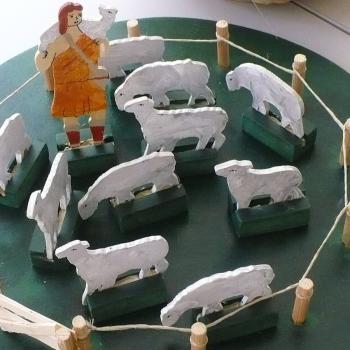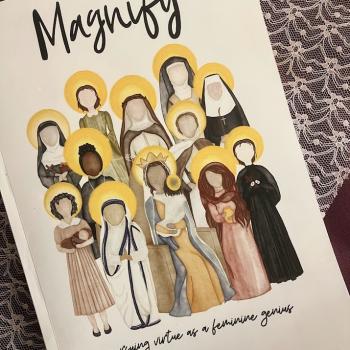I’ve been in the depths of back-to-school preparation on multiple fronts, and I’m continually astonished that people still bring up the old “socialization” thing with respect to homeschooling. So let’s be blunt: Homeschoolers do not socialize the way school kids do.
It’s a spectrum, of course. There are many school families that don’t get sucked into the assembly-line socialization rut, and thus teach their kids to cultivate a mature social life long before graduation. There are likewise homeschooling parents who cling so happily to their middle school social skills that they pass them on to the second and third generation. But if you’re in for the full Not-Back-to-School Social Life Experience, here’s what you can expect:
1. Homeschool kids break their own ice.
I picked up my son from his Confirmation kick-off event, a true microcosm of suburban 9th grade living. We were delayed in departing, and I noticed he was chatting with a boy I’d never met before, who had “Chris” written on his name tag. We got in the car. “So I saw you were chatting with, um, Chris? Is it? Nice kid?”
Usually the boy has a few interesting stories to share about the people he meets. This time he shrugged. “I don’t know. I just started talking to him when you showed up. We were so busy doing ice breakers we didn’t get to actually meet anybody.”
Yeah, homeschool kids don’t get ice breakers. You show up at a new event with people you’ve never met, and your parents leave you to the wolves. “Go find some kids. Or make yourself useful somewhere.”
They always do. It can take as long as five or ten minutes, if it’s a large group event the kids are joining midstream. But my kids never sit in a corner neglected. They are in the habit of introducing themselves, striking up a conversation, and finding something, anything, in common with whomever is tossed their way.
2. Homeschool kids spend the bulk of their time with people different from themselves.
Sitting at a lunch table with the same five friends every day, exactly the same age, same academic track, same clubs, and same fashion tastes? Yeah, that never happens in homeschooling. Mixed-age, mixed-neighborhood, mixed-ability social circles are the norm among homeschoolers. Cliqueishness is a no-go, because 1) the parents lose patience with that nonsense fast and 2) on any given day, you might have to be friends with exactly that one person you would have happily excluded if only this were the lunchroom and you had the choice of your favorites.
From there, it only gets more different: Homeschool kids spend a lot of time with grown-ups. Not just their parents. Not just teachers. (As a kid writing fiction, I could only ever think up “teacher” for a profession for my adult characters, because that was the only profession I was ever exposed to enough to have an idea of what the job entailed.) Homeschool kids spend their formative years going wherever their parents go, doing all the adult chores that grown-ups do. The people who live and work in their community aren’t stage hands for a me-centered teenage drama; they are the community. Homeschool kids get used to having spur-of-the-moment adult conversation with grown-ups of every age, profession, and cultural background.
3. Homeschool kids form deep, lasting relationships with the people they treasure most.
A reality of homeschool life is that you might have certain very dear friends you only see a few times a year. Of all the many friendly-acquaintances you gather everywhere you go, a few really resonate. They’re ones who understand you. They’re the ones you could spend hours talking to, and when you pick back up again six months later, it’s like you just saw each other yesterday.
School friendships are a little bit like this, in that you socialize all year with whomever is at hand, but very few of those friendships carry forward once you’re no longer in the same class or club. It’s easy to imagine at school you’ve got a real friendship going, when really those friends will drop you as soon as they find something better.
The homeschooling difference is that there’s never any illusion that you’ve got five best friends sitting next to you at lunch each day. You have to be intentional about cultivating your friendships, and you’ve got the mental space to do it in. When you find that one good friend, you make an effort to stay in touch. You learn to use whatever resources you have at hand to arrange a way to get together more often. Sometimes you discover that the friendly acquaintance was only ever just that, or the friendship wanes as your values and interests diverge later in life. But it’s not uncommon for homeschoolers to have multiple deep, lasting relationships that endure for years despite distance and long separation.
It’s okay to have a mature social life at a young age.
Sometimes I hear parents lament, “My kid gets along better with the teachers than the kids in his class at school,” as if this were a bad thing. As if the desire to spend time in intelligent conversation with someone who wasn’t obsessed with the latest trends or popularity scores was somehow indicative of a deficiency. (Sometimes the kids are more grown-up than the adults, though.) We pay lip service to “be yourself” and then get upset at children who don’t “fit in”. You can’t have it both ways.
Meanwhile, when my kids show up for activities that involve a mix of kids from all educational backgrounds, one of the questions they get immediately after their homeschooling status is divulged is, “But how do you make friends?”
To which we must answer, “What is wrong with you that you can’t make friends unless you are forced to spend six hours a day with thirty other kids exactly your age?” Actually we don’t say that. We try not to even think it. And then, because we are well-socialized, we make friends with the kid who asked the question.

Image by H. Zell (Own work) [GFDL or CC BY-SA 3.0], via Wikimedia Commons
















